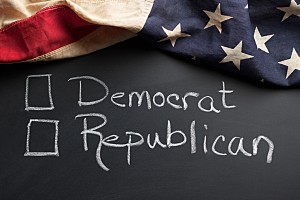Switching political parties may be a simple strategy of convenience

By Marianela Toledo | Florida Watchdog
MIAMI — As the old political adage goes, where you stand depends on where you sit.
Take Charlie Crist for example.
PICK ONE: Yes, changing one’s mind can be a good thing. But it’s difficult to say that in politics because “it’s hard to know who is the real person is behind the candidate,” a political pundit says.
He was elected Florida’s governor in 2007 as a Republican, but near the end of his first term he left the party, became an independent and launched an ill-fated campaign for the U.S. Senate against GOP nominee Marco Rubio and Democrat Kendrick Meek.
Now Crist wants to be governor again, but this time he’s running as a Democrat.
Crist is not unique. He’s not the only Florida politician who changed their political stripes.
State Rep. Ana Rivas Logan of Miami was a Republican and is now a Democrat, and the state party welcomed her with opened arms.
“The GOP of today is not the party I joined,” said Rivas Logan in a news release announcing her change is affiliation. “It’s a party that has been radicalized and held hostage by a group of extremists.”
Scott Herman is another. He ran for state representative in 2012 as a Republican, but lost to Democrat incumbent Perry Thurston. Shortly after that race, Herman switched to the Democrats and he’s running again.
It’s not just politicians jumping ship. The Democratic Party of Miami-Dade recently held a news conference to celebrate a group of citizens who changed their party registration from Republican to Democrat.
While the common denominator seems to be disappointment in their party’s core values, one can’t help but wonder if there’s more to the story.
“Sometimes it’s rational to change one’s mind,” said Kenneth W. Goodman, a professor and director of ethics programs at the University of Miami. “When one party no longer represents the values of the candidate, it becomes a responsibility to change parties.”
But Goodman questions the motives of the political turnabouts.
“Do you change your party as a point of intellectual commitment or do you change your party because you think you are going to get more votes?” he asked.
It’s hard to know.
“One of the things we lack in politics — this is not new — is we lack of authenticity,” he said. “It’s hard to know who the real person is behind the candidate.”
Pollster and political strategist Dario Moreno told the Miami Herald that Rivas Logan’s change of party was likely motivated by her desire to “resurrect herself as a state representative.” He said “those seats are becoming more competitive,” and in this case, the Democrats are running what he considers to be “a competitive candidate” against State Rep. Erik Fresen.
There’s no law against changing parties, according to a study from the Legislature’s Committee of Ethics and Elections, “Legal Implications of Candidate Party Switching in Florida Elections”. All that’s required is a declaration the politician hasn’t been a member of any other political part for at least six months before the general election in which they are qualifying.
For Crist, the party switch may be a good move. A poll by Sunshine State News shows that in the race for governor, incumbent Rick Scott leads Crist by only a thin 1 percentage point margin, 45 percent for Scott to 44 percent for Crist.
“While Scott’s lead is within the margin of error, the poll reveals the Republican holds an important 5 point lead over Crist among Floridians more likely to cast votes in the November election,” states the survey, which was conducted March 31-April 3 with 800 registered Florida voters. The margin of error is plus or minus 3.46 percent.
Contact Marianela Toledo at Marianela.Toledo@FloridaWatchdog.org or on Twitter @mtoledoreporter







